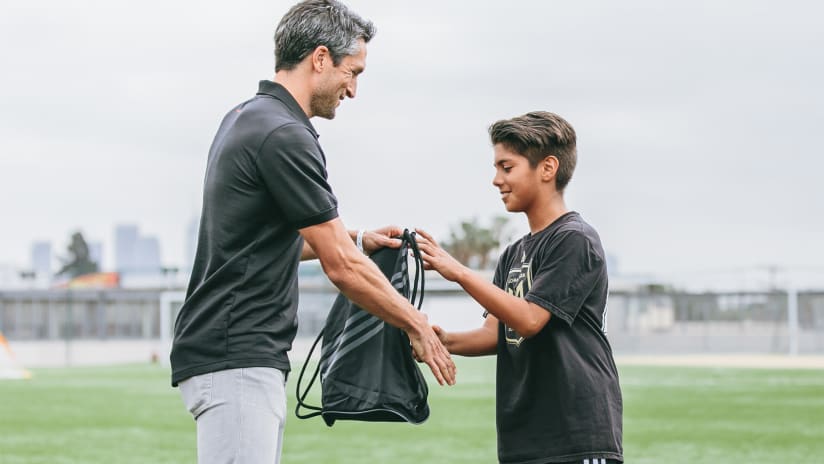We were all sitting in the living room of our new home in South Gate—my parents and my five siblings—deciding my future.
I had just been invited to try out for LAFC as an academy player. I was grateful for the invitation, but I wasn’t sure what to do. I would be leaving a club I loved for one that was not just foreign to us, but foreign to everyone. This was 2016. LAFC was brand new, a club the world had never heard of.
The first time I ever heard of LAFC was a few weeks earlier. I was playing for a club called Fullerton Rangers and we were playing a team called FC Man United. (They had a midfielder named Erik Dueñas.) After the game, Joey Cascio (my first LAFC academy coach) approached my parents and said, “We’re creating the first LAFC academy team. We want Diego to try out.”
After trying out, they asked me to officially join the club. And now I was sitting in the living room with the people I love the most: my mom and dad (Luis Enrique and Sandy), and my five siblings (Maximo, Ulysses, Celina, Isaac, and Alex) who are all older.
Yep, I’m the baby. I was ten years old.
I also didn't mention that our house had burned down a few months earlier, forcing us to move to our new home in South Gate where we were now sitting.
No matter how old I was, joining a new club was always a big decision. From my first-ever club team, HG Eagles, to Fullerton Rangers, and now this new opportunity at LAFC. Every team I played for, I always gave it my all. I loved my teammates. I loved their families. Why would I switch things up?
My parents were thinking about the bigger picture. At clubs that aren’t affiliated with a pro team, you usually play through their oldest age level, U-18, then hope a college offers you a scholarship or a professional club invites you to try out. Most guys get neither.
LAFC presented a path toward becoming a professional. All I was thinking about, though, was how much I’d miss my teammates with Fullerton.
My family decided I should take a few days to think about it. During those few days, I had a lot of mixed emotions, but in the end, I said, “I’m doing it.”
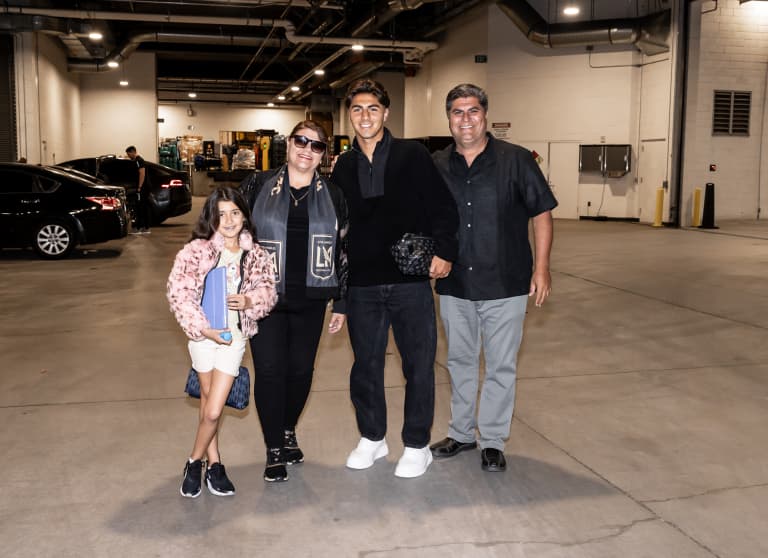
This is where the movie cuts to our game against Seattle earlier this season. Before the game, I was a 17-year-old version of the 10-year-old kid driving into the stadium with his parents. We were in the underground parking lot; there were cameras and security people all around, and rows of cars driven by other players on LAFC’s first team. I was nervous but mostly excited. It was my first game as a member of the first-team roster.
I had come a long way since that sit-down in our living room.
I’m an LA native, born and raised, so to reach LAFC’s 25-man roster as a “homegrown” player—a player who had been identified by the club and developed by its academy—was a special honor. My story goes deeper than that, though.
My dad was born in Mexico. My mom was born in Texas. Both sides of my family come from Villa Hidalgo, San Luis Potosí, in the heart of Mexico.
With my family, it was always soccer. No other sports. My four brothers played soccer. My favorite club growing up was Club América because my brother Isaac played for their second team. I also liked Barcelona because they had my favorite player, Carles Puyol. He was Barça’s captain in the years before Messi. I always admired Puyol’s leadership. He wasn’t the fastest but he was always in charge. And he was a center back, like me.
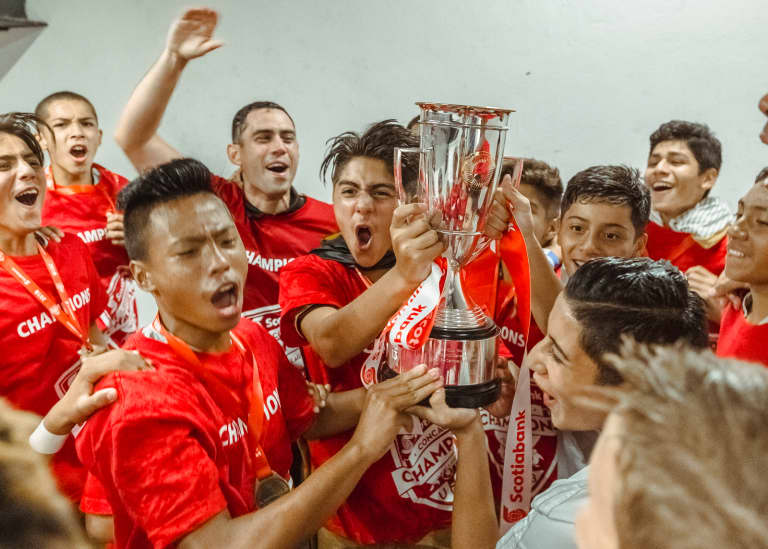
After joining LAFC I was named captain of our academy team. I remained a captain all the way through, at each level. We had success throughout those years, including winning LAFC’s first-ever international trophy in 2018 (U-13 Concacaf Championship). I remember Bob Bradley [LAFC’s first head coach] telling me in the 2020 preseason, when I made my debut in a friendly against Peñarol at age 14, “All the things you learn here, take them back to the academy, teach and lead the others. Serve the group.”
I’ve heard people say I’m a natural leader. If that’s so, then I credit my parents. Both are leaders but in different ways. My dad is always focused, always disciplined, always on time. That’s me. I hate being late. My mom is late sometimes but always has energy, joy, and faith in God. That’s part of being a leader, too. I have a little bit of both personalities in me.
Some people think being a leader means talking a lot. For me, leadership is about building a relationship with each of your teammates. Your teammates can’t respect you if you don’t know one another. When the going gets tough, you want to be sure you can trust the person next to you, so that you can have each other’s backs.
The club has grown so much since those early days when I was invited to try out. I mean— our first practices were futsal games; that was our training. Then we started practicing at East LA College, then we moved to Cal State LA, where we eventually built our Performance Center.
The land where the PC is now – it used to be all grass. And Erik Dueñas and Bryan Moyado – the other guys on that original U-12 team in 2016 – sometimes we look back to the days when we trained on futsal courts or torn-up intramural fields. I can still picture this one training session we had in the pouring rain. Joey [my first LAFC academy coach] making us play rondos in the muddy grass. These are the types of memories that will stay with me forever.
I’m proud to have played a role in building LAFC. The growth of the club – the process of becoming the soccer team in LA – for me, it all starts with our supporters. I remember the first time our [U-12] team played Galaxy. A ton of LAFC supporters came to the game. We couldn’t believe it! We were just a bunch of 11-year-olds! That’s when I knew that LAFC fans were different. That this club was different.
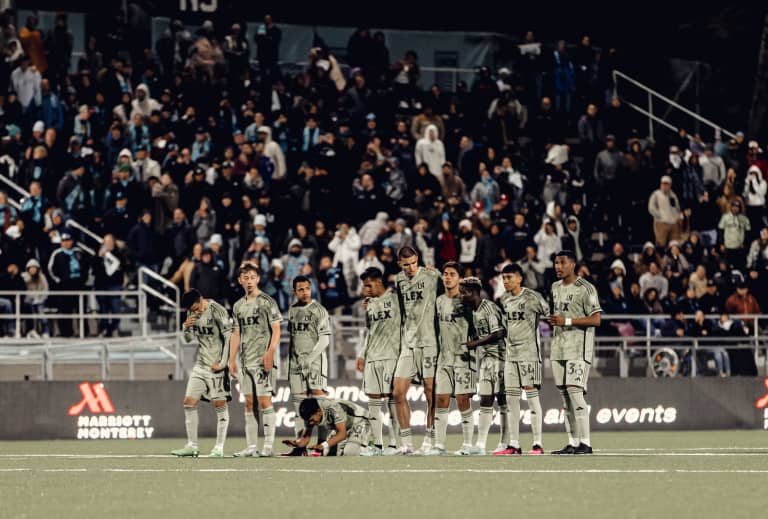
I felt it again earlier this year when we played our US Open Cup match against Monterey Bay. I played all 120 minutes, plus the penalty shootout. It felt like we were out there forever! It was a frantic game, too. After the overtime periods, it was tied 2-2, and after five rounds of penalties, we were still tied. We had picked our five penalty takers, but we never picked a sixth. They called my name from the sideline just a few seconds before the next kick. I had to go out there and do it.
My dad says he can tell how confident I am in a penalty situation by the way I walk up to the spot. “The way you approach that opportunity says what kind of person you are,” he says. I put the ball down and took a deep breath. I had just told my teammates that I was gonna shoot it straight down the middle, and that’s what I did.
It was the last penalty we took because after I scored, our keeper Eldin [Jakupovic] walked up to me and said, “Don’t worry, I’m going to take care of this.”
And sure enough, he blocks their penalty. Boom. That’s a game. We went crazy.
I played all 90 minutes in the next round against the Galaxy, too. Look, I know they’re our rivals, but being on the same field with Chicharito was a big deal for me. My family is from Mexico, and he’s a Mexican superstar. I watched him all the time growing up. I remember standing next to him during that game and seeing the name on his jersey: CHICHARITO. I can’t describe it. I feel the same way when I train with Carlos Vela. He’s a teammate, but he’s also … Carlos Vela.
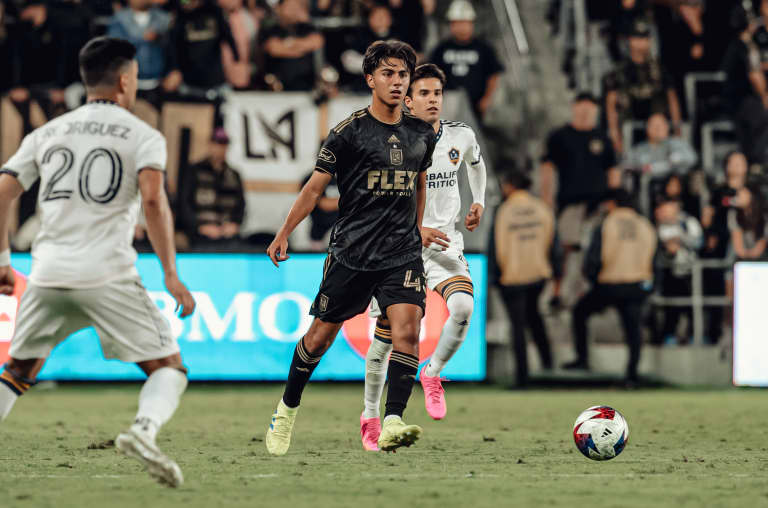
What stands out the most from those two US Open Cup games was having my parents there. For those of you who know my mom, she always cheers the loudest at my games. At academy games, she would always lead the chants. If she had to miss a game it was always quieter. Hearing her during the Monterey Bay game and then finding her after the Galaxy game and hugging her and my dad – I could tell they were proud of me. That’s all any kid wants.
So yeah. Family is big for me. Thinking back to when our house burned down LAFC reached out to us and everything was happening so fast – my family was my rock. My foundation. I turned to them for support. Just like we rely on our fans when we need energy or a push in a positive direction.
I still think about that talk we had together in our living room. If I had talked it over with just my dad, or just my mom – or with one of my siblings – I might not have made the same decision. But with everybody there, and everybody telling me they supported me, I knew I would be OK.
It’s like playing a home game at a packed BMO Stadium. When your entire family is behind you, you can’t go wrong.

This is the third story in an ongoing series that introduces LAFC players in their own words. Read about, Erik Dueñas and Nathan Ordaz.
Esta es la tercera historia de una serie en la que presentamos a los jugadores del LAFC en sus propias palabras. Leer acerca de, Erik Dueñas y Nathan Ordaz.

